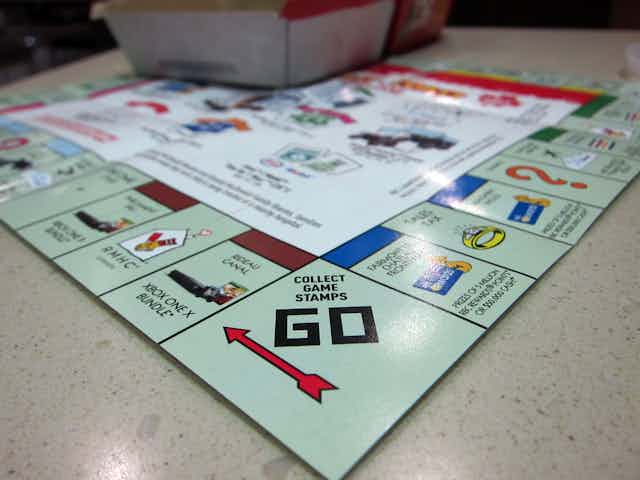In 2000, a fraud worth over $24 million was uncovered in the United States. Jerome Jacobson, who served 15 years in prison for his role in the deception, was at the centre. This was not your typical heist, however. No identify theft or insider trading here. Jacobson’s crime: He cheated McDonald’s Monopoly.
Jacobson was an employee for the marketing firm that ran the McDonald’s Monopoly promotion in the 1990s. He stole some of the major game pieces and gave them to friends. After being caught, Jacobson told investigators he learned the contest was already rigged against Canadians. Specifically, prize locations were re-randomized by the marketing company to prevent major winning game pieces reaching Canadian customers.
Today, McDonald’s Monopoly is in full swing with a purely Canadian edition, so all the prizes should be up for grabs until the contest ends Nov. 11.
Instant-win food prizes are your best shot, but just like the classic board game, the contest incorporates a tantalizing format. You must collect a set of matching properties to scoop one of the top prizes.
Find Parliament Hill and the Rideau Canada? You’ll take home an Xbox One bundle. Niagara Falls and Château Frontenac? Fifty-thousand dollars could be yours.
A probabilistic experiment
Playing the game is itself an interesting probabilistic experiment. If you’ve played enough, you might have noticed patterns emerging. For every coloured set, you’ll find the same properties several times, but one will (probably) always seem out of reach.
Like most games of chance, McDonald’s Monopoly works well because we, the players, don’t fully understand the odds. Unpeeling a game stamp to find the dark blue hue of Niagara Falls is an easy thrill — you’re just one property from the cash. Halfway there.
Except, of course, you’re not.
Regular players know the game is controlled through “rare” pieces. Anyone can find a Parliament Hill or a Niagara Falls. But there are only 20 Xbox One bundles and six $50,000 prizes to be won. Overall there are fewer than 200 prizes across the “Collect and Win” element of the game. What does it take to be one of the lucky ones?
To do the math, we can turn to the official rules. As with most contests of this type, McDonald’s specifies the odds of winning each prize. As a statistician, I revel in these numbers and what they say about the structure of the game.
Odds: One in 16,066,918
A first surprise is that the common properties are evenly divided. You’re just as likely to find Parliament Hill or Niagara Falls, with a one in 11 chance for each. It really is all about the rare ones, and “rare” is a definite understatement.
For the Xbox bundle, you really need the Rideau Canal. Your odds of it being your next property? One in 4,820,076. Want $50,000 for finding Château Frontenac? It’s one in 16,066,918.

These numbers are so large they’re hard to imagine — and this is something contest organizers rely upon. Communicating risk is not easy, and is something I think about a lot.
Some comparisons work better than others. Statisticians love to talk about tossing coins (the odds of getting 22 heads in a row is one in 4,194,304), but I prefer real-world examples. Think about the everyday events you do — and don’t — worry about. You may be surprised by some of the underlying probabilities.
The British Medical Journal has published a wonderful table on “everyday risks.” It ranges from your chances of dying in a traffic accident (one in 85 for those who have been driving more than 50 years), being murdered (one in 100,000) or being struck by lightning (one in 10 million). Finding Château Frontenac in McDonald’s Monopoly, therefore, is off the chart.
That said, the chances that McDonald’s refer to are of a randomly selected property being the one you need and to make comparisons on this isn’t quite fair. Most players will acquire dozens of them over the course of the game.
Calculating the odds
Knowing the probabilities, you can fairly easily calculate your chance of finding a rare property across any number of plays. If the rules say a property has odds one in p, and you have n property stamps, then your chance of finding that property at least once is one in q, where:
q = 1/(1 - (1 - 1/p)ⁿ)
For example, if you want Château Frontenac (p = 16,066,918) and buy 32 Big Macs with two chances to win (n = 64) on each burger, your chances of finding it are a little less than one in 250,000. According to the British Medical Journal, that’s about as likely as your house being hit by a crashing airplane. Not bad!
Finding ways to explain these astronomical numbers is an important task for statisticians and non-statisticians alike. Smaller odds are easier, but still may lead to surprising comparisons. Your one in 5.46 chance to win some free food with McDonald’s Monopoly is a little better than winning a coffee or doughnut with Tim Hortons’ Roll Up the Rim (one in six) and a little worse than dying of heart disease (one in five).
Most players, of course, are not really expecting to win big and no one likes to be told (especially by a statistician) that they have no hope of winning. There will be some big winners in Canada this year, but for most, the game is a fun optional extra — you’re still getting your Big Mac and fries regardless of whether you grab thousands of dollars or an Xbox as well.

